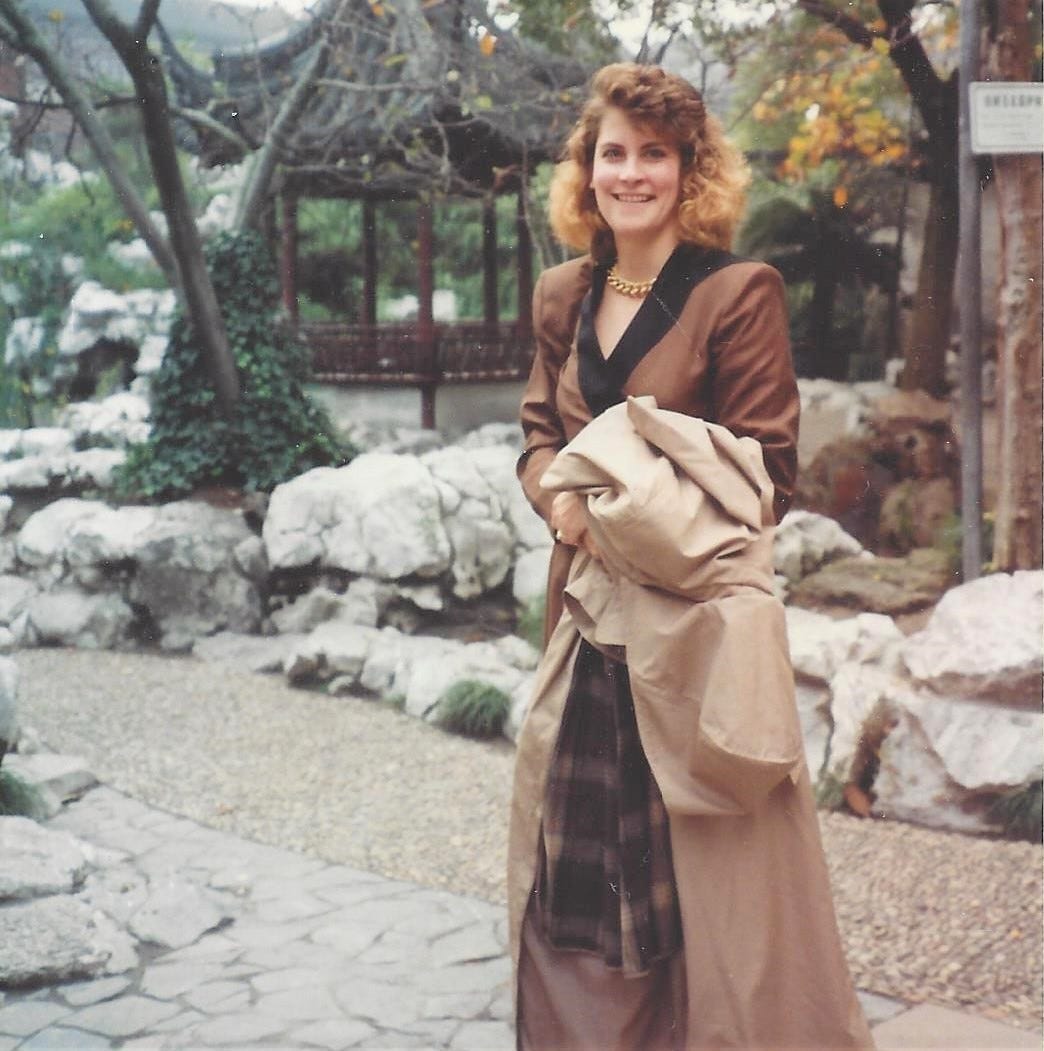The bonus gift in every thank-you note
And surprise! It goes to the sender
That’s 27-year-old me at Yu Garden in Shanghai, just after encountering a group of 50 or so schoolchildren on the street, who smiled, waved at me, and shouted “hello” in perfect English as their teachers looked on. I must have looked just like one of the illustrations in their English language textbook.
Since I’d arrived in China, I couldn’t help but feel like I stuck out like the proverbial sore thumb. With blondish curly hair and green eyes, it was hard not to stand out in a sea of humanity with dark hair and dark eyes. It was strange to walk around and feel like everyone was staring at you.
Somewhat improbably, the pharmaceutical company I worked for had decided that I was one of the first people they should send into a country that the U.S. was beginning to “constructively engage” with. But with 21 million babies born annually, they needed a senior market research analyst to assess the market for baby formula.
Though it was one of the times in my life that I most felt like a fish out of water, what ended up saving the day was the people. One of the best things about traveling for Wyeth was that, without fail, the local employees were extremely hospitable to the people visiting from headquarters. They even went out of their way to ensure you had a chance to play tourist while you were there.
While I was in Beijing, Bai Hang, a young employee from Wyeth China, gave up her Saturday to accompany me to the Great Wall and the Ming Tombs. She was an excellent companion, so happy to show me around and practice her outstanding English language skills, and we had an enjoyable day together.
I always traveled with a box of blank thank-you notes in my briefcase on my trips for Wyeth because I always had plenty of notes to write on the flight home. The thank-you notes were some of the easiest I have ever written because I felt such a deep sense of gratitude to the people who went out of their way, either in significant ways or with small gestures, to make me feel welcome.
Sometimes my new friends wrote back to me. When looking through my photo albums recently, I came across the thank-you note I received from Bai. It’s funny that so many years later, I don’t remember much about what the Ming Tombs were like, but I still recall how delightful it was to spend that day with Bai.
How cool was it that she had taken the time to write to me to let me know how much she had appreciated the day we spent together? And even though that note is now 30 years old, it still retains its power to help me experience again the gratitude I felt for Bai having given up her Saturday to ensure that a young American would return home with warm memories of her time in China.
I know I didn’t have to tell you that you should always send thank-you notes because your mom probably hammered that idea into your head long ago. But I wanted to let you know that thank-you notes have value beyond being a social nicety.
Gratitude doesn’t just bless the person on the receiving end; it also benefits the person who expresses it.
In fact, if you ever find yourself on a run where you’re complaining frequently about all things great and small, gratitude may be just what you need to bring yourself back into alignment.
You see, it isn’t so much that we hit stretches of life devoid of things to be grateful for; instead, it’s that we fail to notice all the things around us every day that we have to be thankful for. We tend to zero in on what’s not going as it should. But life should be filled with more than just focusing on what’s gone wrong.
In some ways, developing a habit of gratitude is like having a pair of magic glasses. On any given day, if you sit and collect yourself for a few minutes and consider what it is you have to be thankful for, often you’ll be surprised by what you’ve nearly overlooked.
Maybe that’s why St. Ignatius of Loyola recommended a daily spiritual practice that includes looking back on your day to identify moments you are grateful for.
As Ricardo da Silva, S.J., has written, “When I look beyond my hurts, disappointments, and pains and open a space for gratitude within myself, I can escape the malaise that renders me helpless, fuels blame of others, and leads me to wallow in ungrateful self-pity. In these rare moments, I can break out in a litany of gratitude for the graces and joys I’ve received, despite ever-present struggles.”
So, Mom was right–you should always write thank-you notes for gifts received and kindnesses extended. She may not have told you this—but I’ll go a step further and say that I think it’s worth putting the thank-you notes you receive on display for a while. I enshrine every one I get in our glass-front kitchen cabinet for a few weeks so that the expressed gratitude receives the honor it deserves.
And more importantly, even if you don’t write a note, make it a habit to recognize the gifts, both large and small, that you receive every day. Gratitude is an emotion too good to miss out on.



